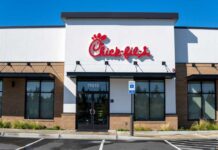
A major food distributor announced this week that many Americans were cutting back on their food consumption amid high inflation rates. The news comes as hopes for lower inflation may be dashed due to persistently elevated food costs.
Conagra Brands CEO Sean Connolly told his company’s investors that Americans were “hunkering down” during the current economic struggles. He added that consumers were purchasing fewer food items rather than buying off-brand products.
“Food companies are starting to wrap pricing in the year-ago period, and dollar sales are coming down as expected, but the rate of improvement in volume recovery is lagging,” he said.
The food company’s CEO added that the company has seen reduced consumption since right after the Easter holiday, “and it has been broad-based across many categories and competitors.”
The company’s CEO described the purchase changes as a “likely temporary behavior shift” meant to “stretch their budgets” and that it would continue at least into the short-term future.
Food prices in May were up 5.7% year-over-year. Food prices at home were also up 4.7% compared to 2022.
While the overall inflation rate has decreased over the last several months, many Americans are still facing significantly higher prices at grocery stores.
While some goods, such as tomatoes, have decreased in price, a large majority of commonly-purchased items are significantly higher in price year-over-year.
I hope Biden plans to start his apology tour today in South Carolina for “Bidenomics.”
It’s time to bring down the skyrocketing prices of gas, food, and electricity for American families struggling under inflation.
As president, I will put more dollars into Americans’ pockets. pic.twitter.com/uULeEkdj7m
— Tim Scott (@votetimscott) July 6, 2023
In May, the price of staples such as eggs, sugar, bread, flour and potatoes were up more than 25%. Other common items such as American cheese, butter and rice were up about 20%.
The increase meant that even as overall inflation numbers appear to be cooling, essential goods such as groceries remain above many Americans’ groceries.
According to a U.S. Census Bureau survey, nearly 90% of Americans said that they witnessed prices increase over the last two months. More than 80% of the public reported that they were concerned about continuing inflation.
Furthermore, members of the Federal Reserve are still concerned about the ongoing effects of inflation. The central bank is considering several more rate hikes, which could increase the chance of a recession.














